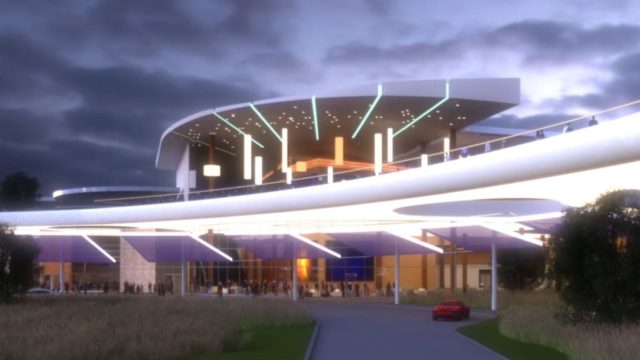A major expansion at Ho-Chunk Gaming Madison got a key approval Tuesday, as the City of Madison Common Council approved a plan to work with the Wisconsin Department of Transportation and the Ho-Chunk Nation to redesign and rebuild the intersection of Mill Pond Road and State Highway 12-18.
The Wisconsin Department of Transportation recently committed $30 million to the project, and the Madison Common Council approved the City’s participation in the project, which will cost the city about $5.5 million, in a 15-5 vote.
The city’s Transportation Committee split on the issue and sent the matter to the Common Council without a recommendation. The objections were mainly related to a lack of pedestrian and bicycle access. Some also saw the project as an undesirable extension of the Beltline.
Ho-Chunk Gaming Madison Executive Director Dan Brown said the intersection as currently configured is “insanely unsafe” as the two-lane Mill Pond Road crosses the busy Highway 12-18. Brown said about 7,000 cars pass that intersection daily, and with the expansion of Ho-Chunk Gaming, that could rise to 17,000.
Alder Arvina Martin, also a member of the Ho-Chunk Nation, noted that rebuilding the intersection isn’t just a favor to Ho-Chunk Gaming.
“Ho-Chunk Gaming is, definitely, the largest establishment around there but it’s not the only one,” she said, “There’s the Magnuson Grand Hotel, there is a Harley Davidson store, there’s a gas station, all on Mill Pond Road, and they’ll all benefit.”
It will, however, benefit the safety Native American people.
Brown noted that about 300 employees of Ho-Chunk Gaming, many Native American, use that intersection every day.
“If we look at it with an equity lens, this intersection disproportionately affects native people, many of whom work at or visit Ho-Chunk Gaming Madison,” Martin said during about an hour of debate on the plan at the Common Council meeting Tuesday. “It really bothers me that we can ignore the safety of those who travel this intersection who happen to be disproportionately Native American because it doesn’t address all of these concerns. And I cannot help but say this smacks of privilege and institutional racism. This isn’t complicated.”
“For a community that talks a lot about inclusion and diversity and equity, it’s very important to put your money where your mouth is,” Brown said in public testimony before the Common Council.
In an interview Wednesday, Martin said she didn’t think alders opposed to the plan were intentionally discriminating.
“I think it was a blind spot for them,” she said. “I don’t think that they saw the institutional racism that was present in voting against it. I don’t think that that was something that crossed their minds until I said it.”
Alders Grant Foster, Rebecca Kemble, Zachary Henak, Marsha Rummel and Max Prestigiacomo voted no.
Before the meeting, Martin sent a note to her colleagues disclosing her membership in the Nation and the fact that she receives per capita payments from the nation and other benefits, but noting that her income would not be affected by the project.
“I just wanted to make it abundantly clear that this whole process was something that I was not involved in and not something that I would benefit from, personally,” she said.
Brown said the expansion will include a modest increase to the size of the gaming floor itself, a hotel with 200-300 rooms, a parking structure with about 1,000 stalls, and a center devoted to Ho-Chunk history and culture.
“The centerpiece of this concept right now is our History Center,” he said in an interview Wednesday. “And that’d be located centrally in our campus. That’s sort of a big driver, we think, for tourism, in addition to an opportunity to educate locals, people from all over the state, nationally, internationally, the history of the Ho-Chunk people. And so that’s an opportunity for us, again, just to showcase our history and tell history in our own voice and not the sanitized versions of historians.”
The project now requires approval by the Ho-Chunk Nation legislature, which meets Tuesday. If approved, the rebuilding of the intersection would begin in summer of 2022.
That delay is actually a good thing at this point, Brown said.
Like many Indigenous nations and other businesses, the Ho-Chunk Nation has suffered tremendous loss in revenue from being forced to shutter gaming operations due to the COVID-19 pandemic.
“If we were scheduled to build next year, I’d say that (expansion is) out of the question at this point,” he said “I think it’s fortuitous that we still have a little ways to go yet in our planning.”




























